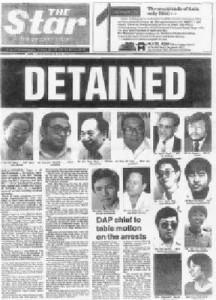By Liew Chin Tong
 The collective adversity suffered by DAP, PAS and civil society leaders in 1987 ironically built the steely resolve for change and the deep camaraderie to see it through.
The collective adversity suffered by DAP, PAS and civil society leaders in 1987 ironically built the steely resolve for change and the deep camaraderie to see it through.
While Mahathir’s base was weak his style was anything but consultative. Further, the various ideas that he bulldozed were more often than not half-baked, resulting in multiple and major financial scandals in just a few years of his rule. Civil society activism emerged from the more discerning and critical urban populace.
The Islamic revival movement was birthed as the rallying point for those who frowned upon UMNO-style get-rich-quick materialism.
Further, Mahathir not only pitted UMNO leaders against each other, he was manipulating ethnic sentiments against each other. In October 1987, the Chinese educationist cause mobilised against a policy of placing teachers who had no proficiency in Mandarin to head the Chinese schools. UMNO Youth under Najib Razak counter-mobilised and whipped up Malay sentiment.
Between the April UMNO election and October, the Mahathir government drifted purposelessly while his party opponents started a permanent campaign to remove Mahathir in the next party election due in three years’ time.
The rift was felt. Mercury rose.
On 18th October, one Private Adam ran amok in Chow Kit with M16 rifle as UMNO Youth was mobilising for a 1st November show of force.
Mahathir seized the timely excuse. On 27th October, Ops Lalang was launched to arrest his fiercest external critics including the then Leader of the Opposition Lim Kit Siang and 16 DAP elected reps. Not only Mahathir did paralyse the Opposition, he terrified the nation and more importantly, his UMNO opponents.
(In the same way on a smaller scale, the arrest of the Reformasi activists in April 2001 was meant to revive Mahathir’s authority after his administration was shaken for half a year , if not longer, after the shocking defeat at the multiethnic Lunas by-election on 29th November 2000.)
A quarter of a century later, as we look back at Mahathir’s mass detention camp of 1987 while on the cusp a possible change of government, there is a sense of poetic justice that Operation Lalang “united” Barisan Nasional’s opponents and gave them a steely resolve to oppose like never before.
Lim Guan Eng, Mat Sabu and many others were young activists at a time when opposition parties and movements were against Barisan Nasional for very different reasons, and often contradictory causes.
But in Kamunting, whatever their causes, they were all behind bars as human beings and as Malaysians for an extended period. They came to realise that Barisan Nasional benefited from mobilisng racial and religious tensions to strike a blow against its political foes.
The ruling coalition controls media resources to set an agenda favoring the establishment. With BN’s ample financial resources and armada of draconian laws, the opposition was divided and conquered.
The only way to break through was to find common ground and fight for political democratisation.
One of the noteworthy reasons to remember October 1987. That, and the sufferings of those arrested and their families, which have not suffered in vain.
The camaraderie forged in adversity continues to solidify the movement to defeat Barisan Nasional and to bring forth a new and better Malaysia for all. -The Rocket



